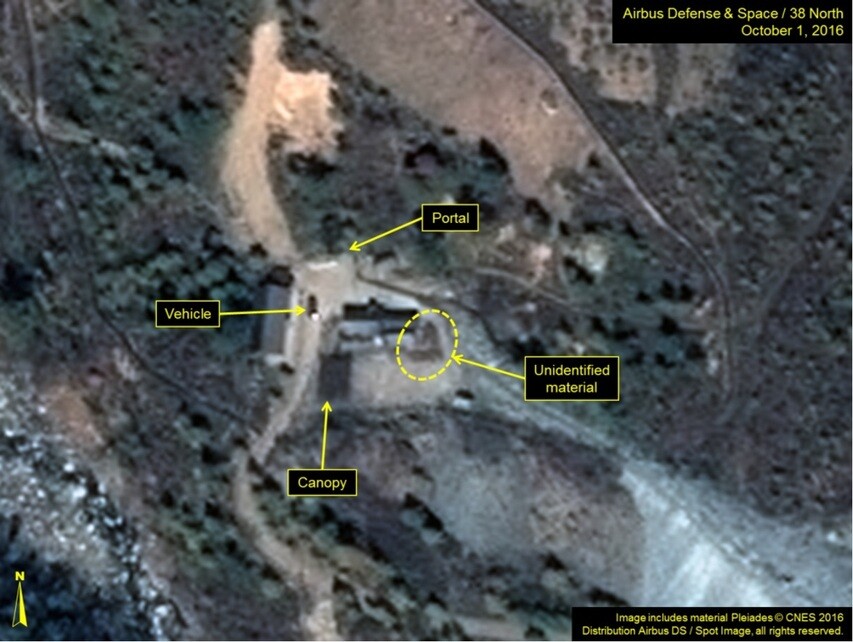hankyoreh
Links to other country sites 다른 나라 사이트 링크
Both Trump and Clinton say that with North Korea, all options are on the table

The campaigns of both Hillary Clinton and Donald Trump have declared that they are not ruling out any options in their North Korean policy, including a preemptive strike. But these remarks do not mean that either candidate is seriously considering such an attack, experts say.
During a discussion organized by the Korea Economic Institute in Washington, D.C., on Oct. 11, Kurt Campbell, former Assistant Secretary of State and a foreign policy advisor for the Clinton campaign, was asked about Clinton’s position on a preemptive strike against North Korea. Campbell responded by saying that Clinton was “not going to take any options off the table at this time,” pointing out that former Under Secretary of State Wendy Sherman had said the same thing during her visit to South Korea, as had vice presidential candidate Tim Kaine during the vice presidential debate.
“The secretary and her team have made clear that North Korea is an urgent matter that requires focused American attention working closely with allies and partners,” Campbell said.
When the same question was posed to Peter Hoekstra, former chairman of the US House Intelligence Committee and a member of Trump’s campaign, he offered a similar response. “When it comes to our national security, whether it‘s throughout the Middle East or whether it’s in Korea, or whether it‘s [. . .] Russia [. . . Trump] won’t take options off the table and he won‘t release a lot of clear signals to people about at least short- and medium-term objectives,” Hoekstra said.
Campbell and Hoekstra appear to have made these remarks not so much because the candidates regard a preemptive strike against North Korea as a viable policy option but rather as a theoretical reference to the guidelines used by the US government when dealing with an enemy state.
“When the US discusses its foreign policy - including its policy toward North Korea - it routinely and habitually considers military options. But that is a completely different issue from actually carrying out military action,” said a North Korean expert in Washington who is well-versed in how policies are made in the American government.
A preemptive strike would mean taking action to destroy North Korean nuclear weapons or missiles when there is clear evidence that they are about to be launched. It is unnecessary to be alarmed by a hypothetical response to a threat that has not yet materialized, the expert pointed out.
Campbell argued that the US should put off dialogue with North Korea and keep putting pressure on the North. “Let’s focus now on the activation of a much more engaged, purposeful sanctions regime,” he said. At the same time, he also acknowledged the failure of American policy and said that the US needed to realize it had not succeeded at shaping North Korea’s decisions.
In Washington, there is a sharp disagreement over the North Korea policy of the next administration between hardliners who support ultra-tough sanctions and don’t rule out military action and moderates who argue that negotiations are necessary.
In a brief posted on the website of the Brookings Institution in connection with the institution’s “Election 2016 and America’s Future” initiative, Evans Revere criticized “gradualism,” or the idea of aiming for short-term goals in freezing North Korea‘s nuclear and missile programs, and argued that tough sanctions should be used to force North Korea to denuclearize all at once. Revere is a nonresident senior fellow at the institution and a former acting assistant secretary of state for East Asian and Pacific Affairs.
While Revere is opposed to a preventive strike, in which the US attacks North Korean nuclear and missile facilities regardless of any indications that Pyongyang will attack, he argued that the US has “every right” to carry out a preemptive strike when there are definite signs of a North Korean attack.
By Yi Yong-in, Washington correspondent
Please direct questions or comments to [english@hani.co.kr]

Editorial・opinion
![[Column] Park Geun-hye déjà vu in Yoon Suk-yeol [Column] Park Geun-hye déjà vu in Yoon Suk-yeol](https://flexible.img.hani.co.kr/flexible/normal/500/300/imgdb/original/2024/0424/651713945113788.jpg) [Column] Park Geun-hye déjà vu in Yoon Suk-yeol
[Column] Park Geun-hye déjà vu in Yoon Suk-yeol![[Editorial] New weight of N. Korea’s nuclear threats makes dialogue all the more urgent [Editorial] New weight of N. Korea’s nuclear threats makes dialogue all the more urgent](https://flexible.img.hani.co.kr/flexible/normal/500/300/imgdb/original/2024/0424/7317139454662664.jpg) [Editorial] New weight of N. Korea’s nuclear threats makes dialogue all the more urgent
[Editorial] New weight of N. Korea’s nuclear threats makes dialogue all the more urgent- [Guest essay] The real reason Korea’s new right wants to dub Rhee a founding father
- [Column] ‘Choson’: Is it time we start referring to N. Korea in its own terms?
- [Editorial] Japan’s rewriting of history with Korea has gone too far
- [Column] The president’s questionable capacity for dialogue
- [Column] Are chaebol firms just pizza pies for families to divvy up as they please?
- [Column] Has Korea, too, crossed the Rubicon on China?
- [Correspondent’s column] In Japan’s alliance with US, echoes of its past alliances with UK
- [Editorial] Does Yoon think the Korean public is wrong?
Most viewed articles
- 1[Column] Park Geun-hye déjà vu in Yoon Suk-yeol
- 2Thursday to mark start of resignations by senior doctors amid standoff with government
- 3N. Korean hackers breached 10 defense contractors in South for months, police say
- 4Kim Jong-un expressed ‘satisfaction’ with nuclear counterstrike drill directed at South
- 5[Editorial] New weight of N. Korea’s nuclear threats makes dialogue all the more urgent
- 6Will NewJeans end up collateral damage in internal feud at K-pop juggernaut Hybe?
- 7[Column] ‘Choson’: Is it time we start referring to N. Korea in its own terms?
- 8[Editorial] Japan’s rewriting of history with Korea has gone too far
- 9[Cine feature] A new shift in the Korean film investment and distribution market
- 10[Column] The president’s questionable capacity for dialogue